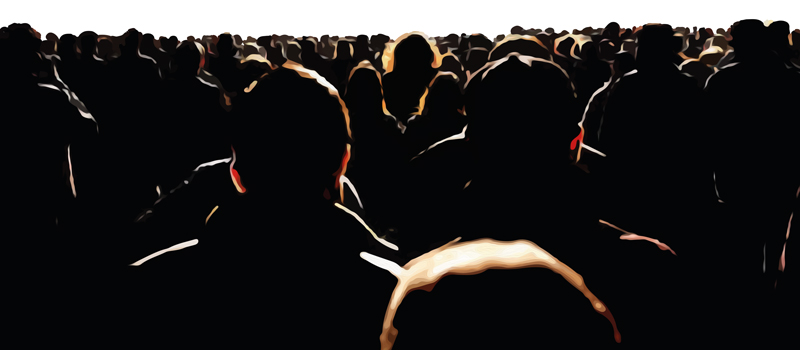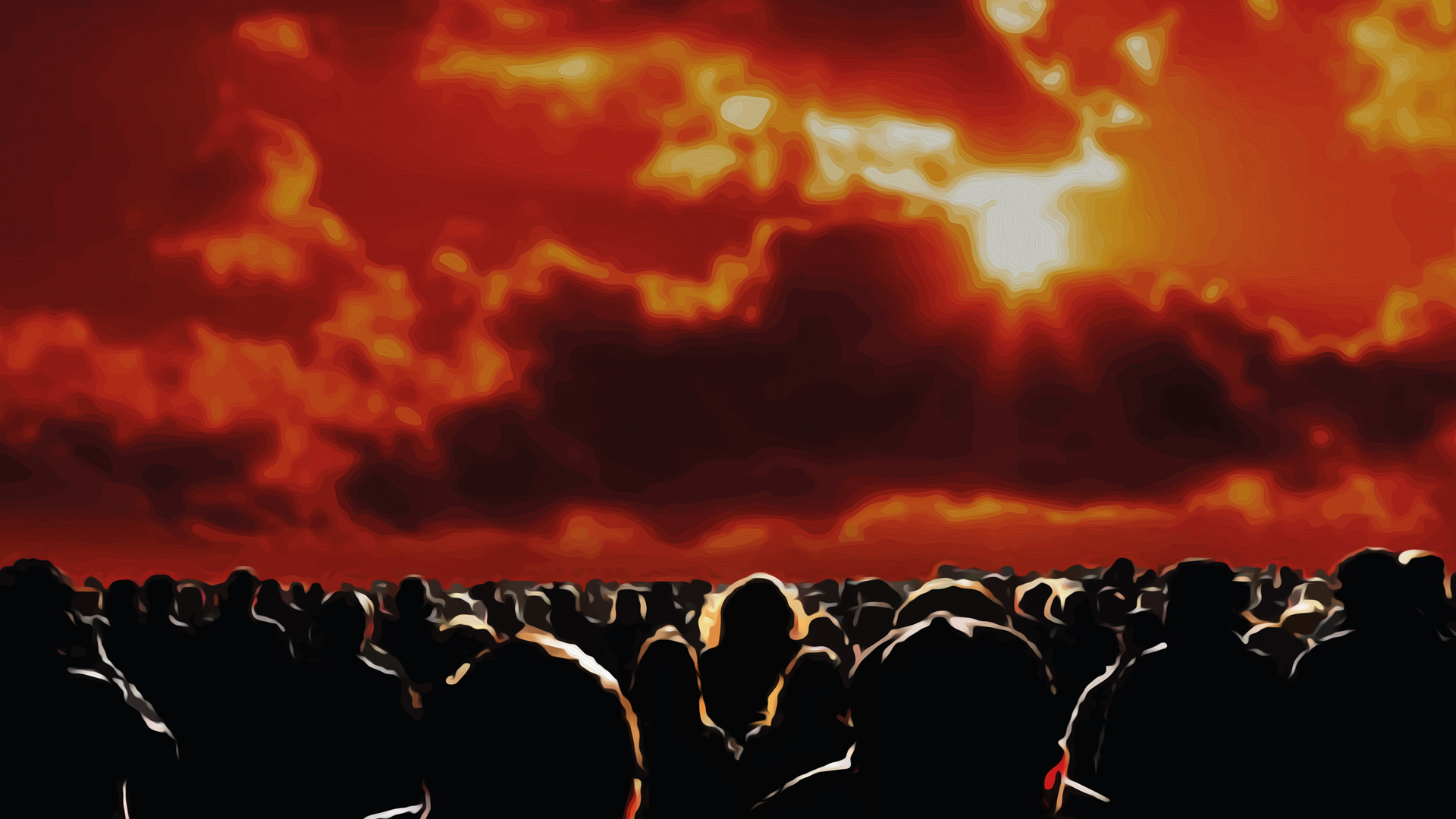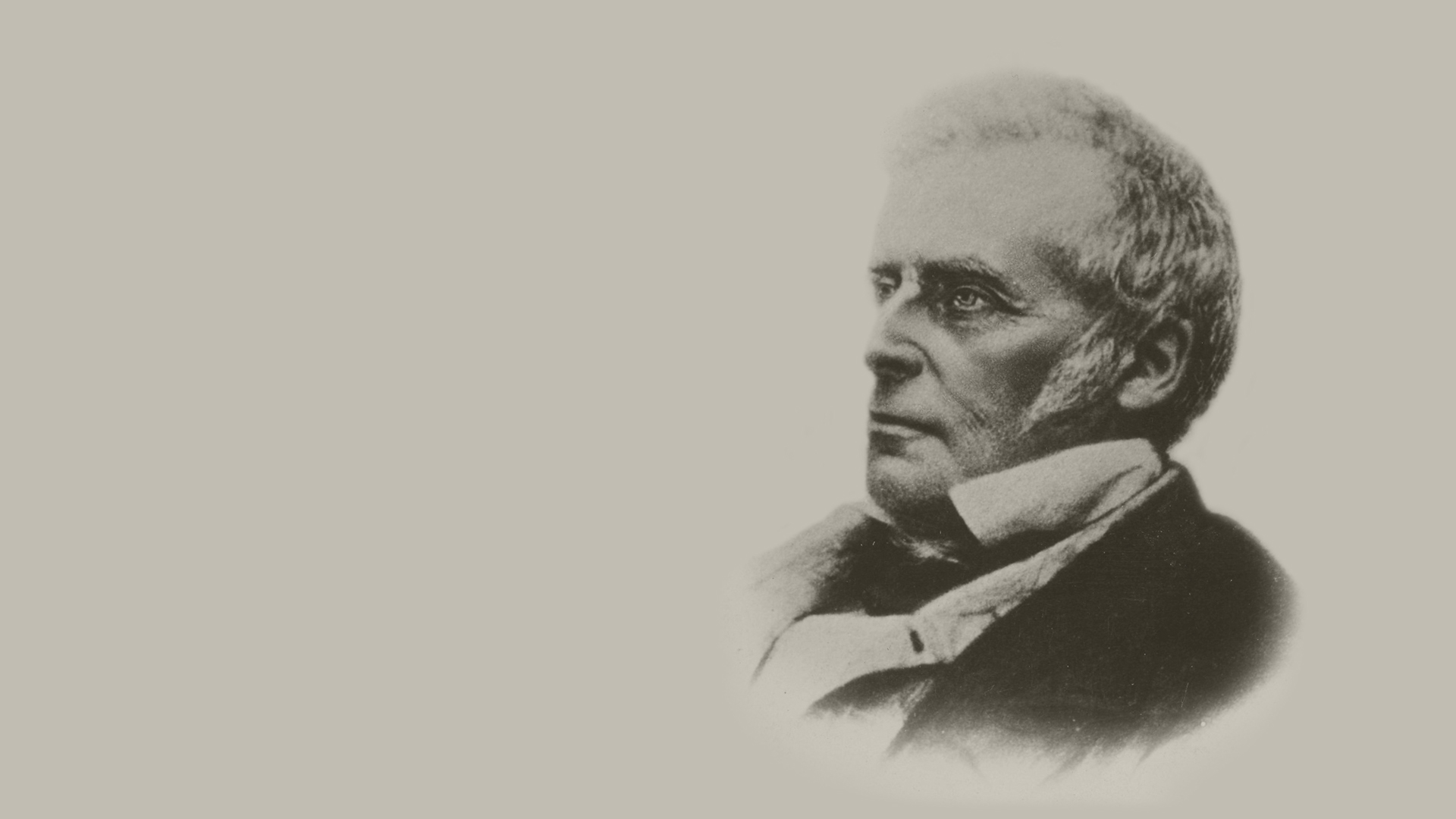Is This the Way the World Ends?
Seeing the End of the World Through the Eyes of Others
When it comes to talk of a coming apocalypse, science, literature and religion have a lot in common. Understanding that, says this historian of religion, science and ideas, is critical to addressing some of the most pressing threats to our survival.
Ideas about the end of the world aren’t limited to religion. In fact, argues Lisa Vox, it’s a common theme in science fiction and even science. Her book, Existential Threats: American Apocalyptic Beliefs in the Technological Era (2017), addresses those commonalities and urges a conversation between people of all persuasions and backgrounds. How else, she contends, can we find a way forward in the face of threats that concern us all?
“Recognizing the entanglement of religious and scientific understandings of the world,” Vox writes, “should encourage more empathy from people who place themselves firmly in one camp or the other. . . . When we look at the history and evolution of scientific apocalyptic beliefs as well as of dispensational premillennialism, we could impose a simplistic story of good versus evil on the one hand or of ignorant superstition versus rational intellect on the other. Neither narrative would capture adequately how and why Americans have responded to modern-day existential threats in ways that recall both the book of Revelation and On the Origin of Species.”
Vox teaches history at the University of Massachusetts. She holds a doctorate in history but is interested particularly in the histories of religion, science and ideas. Vision’s Dan Cloer spoke with her about her book and its message.
DC What question were you answering in this book?
LV I grew up in the Southern Baptist Church learning dispensational premillennialism. I could have told you about the likely candidates for the Antichrist by the time I was 9 or 10. This was the 1980s, and I remember the Cold War; I remember watching the movie Red Dawn [1984], but not so much the nuclear anxiety. This is the stuff of my childhood.
When I began to get interested in looking at these issues from a scholarly perspective, I was kind of shocked to discover in college and in grad school that people thought the beliefs I had been brought up with were kind of crazy. This project started with the desire to rectify that.
DCHow would you define the key terms in your book: apocalypticism, premillennialism and dispensationalism?
LVA lot of the time, apocalypticism might be about the end of civilization, of a nation-state, or of the world. In my book I’m concerned with the end of life, the end of the universe, the end of human or planetary existence.
Millennialism has to do with the expectation of a future 1,000 years of peace; it’s a utopian vision, and to some, that 1,000 years of peace is literal. In this book, I am talking about the literal view. The premillennialist believes that Christ will return and that He Himself will usher in the 1,000 years of peace and will actually reign over the earth during this time. This is opposed to postmillennialism, where people believe this time of peace is something humans would usher in, and then Christ would return. Amillennialism is less focused on Jesus Christ and sees it as a more spiritual state.
Finally, dispensationalism is about dividing history up into what are called dispensations, or periods of time. These are created according to the method of salvation understood to operate in each period. So, for instance, one dispensation would have been during the Garden of Eden, where essentially obedience to God was the method of salvation. The current dispensation, according to dispensationalists, is salvation by the grace of God because of the sacrifice of Jesus Christ on the cross. But the number of dispensations tend to vary according to a person’s beliefs; sometimes there are as many as seven. They take us through biblical history to the present and even into the end times.
DCWasn’t it John Darby, in the 1830s, who made a connection between millennialism and dispensationalism, and who popularized the idea of a so-called rapture?
LVDarby taught that prior to the return of Jesus Christ all true Christians—the community of believers—would be essentially spirited into heaven. This would happen prior to a seven-year Tribulation period, when the Antichrist would emerge. In uniting the world around his leadership, the Antichrist would usher in the apocalyptic wars that would bring about the end of the world, except for the return of Jesus Christ preventing that from happening. His idea of a rapture was very new.
DCSo you place all of these concepts under the umbrella of apocalypticism?
LVYes, these are forms of thinking about the end times. One of the things I like about history, and projects like these, is trying to understand how people in other times and places have viewed the world—to try to understand their worldview and what goes into that. When I was thinking about writing something about dispensationalism, I was also looking at various apocalyptic media. And I began to notice, when I watched anything that was secular, how similar the ideas were to those I had grown up with. I wanted to look at this more closely.
“I became interested in the point at which people started to think the world could end without any help from God or any supernatural cause.”
It was an interesting and very significant shift to reach the point where people think, “Maybe the world could end because of something we do. Maybe the world could end without any meaning or purpose behind it.” When did these ideas emerge? It turned into an exploration of the relationship between religion and science, but what I really wanted to understand was the apocalypticism I had grown up with and its origins.
DCYou were interested in the development of the religious ideas you’d been taught alongside the history of modern science?
LVYes. I was frustrated because whenever I read the scholarship on these ideas, they were represented as a bit bizarre and off the beaten path. To me, that just was not the case. So when I began (and this was an ongoing project over 15 years), the situation was rather discouraging. My disappointment with the treatment of these ideas was the motivation to start this project.
DCThe subject does tap into something that seems to be a fundamental human interest. Did you have a particular audience in mind for your book?
LVIt’s a weird book, and I realize that it doesn’t fit into any neat categories. I hope other historians are reading it. I think anyone interested in the history of apocalyptic ideas, nuclear anxiety, science fiction and environmentalism might benefit. People in general might benefit from thinking about where the ideas in a lot of the media we’re consuming right now come from. It’s been astonishing to me to see the uptick in apocalyptic media since 2001. I’m constantly being bombarded with apocalyptic movies and TV shows and references. Apocalypticism has an appeal because it offers meaning and neat explanations for troubling things that are happening right now. What are the precedents and sources for these ideas?
DCAs I was reading, I created my own visual aid representing the cross talk between the areas you were describing—science, religion; technology, theology. Am I right in understanding your book as analyzing the connections and influences of these four areas on each other?
LVThe similarities do strike you when you start looking for them. Whatever your background, I think we have all grown up with that warfare concept—of one side against the other.
“It really is embedded in our society that religion and science are at odds, even though we can see that in many ways they’re treating the same questions in similar ways.”
DCIn the preface you write, “The way Americans face existential threats today is indebted to the related histories and similarities between religion and science.” Would you elaborate on that?
LVI’m trying to imagine a truly secular or scientific apocalyptic without religious influence being necessary; it’s very difficult. As I say in the book, it’s clear that for a lot of the ways we talk about the end of the world—due to climate change, nuclear weapons or something technological—we’re indebted to religious ideas and language. It’s impossible to imagine how we would be talking about these threats without a religious backdrop in our society. We need to be aware that, even if we aren’t conscious of it, these ideas make their way into how we discuss not just religious beliefs but the very real problems that are facing our society.
One thing that has struck me about how we talk about climate change or nuclear war or a threat of an asteroid impact is that we don’t talk about the intermediate stages. By that I mean we seem to assume the world is going to end and everyone is going to die and that’s going to be it. In the case of climate change, it’s much more likely that there will be mass suffering. But we don’t talk about that.
The “end” really means the world becoming very different in terms of where and how people live. We jump right to the end, I think, because of the religious backdrop. And this prevents us from talking about ways we might ameliorate the effects or avoid the extinction event. The way we talk about existential threats is indebted to this shared history, but we don’t acknowledge that or talk about it.

DCDo you think apocalypticism gets in the way of making progress on environmental problems?
LVI think it can. I understand that, historically, scientists and environmentalists have needed to alert the public to the dangers of particular problems: pollution, pesticides, climate change. In the past 10–15 years these warnings have become very despairing in tone, and in some ways it seems to me that people are giving up. My fear is that we are so bombarded with apocalyptic images that it will engender a passivity. Robert Jay Lifton called it psychic numbing. He wrote about living under the threat of nuclear annihilation. Although he received some criticism, I think in a broad way it’s a useful concept.
“When we’re aware of the many ways the world could end, it’s easy to have a sense of helplessness. But we also have more power now to address these problems.”
DCConversely, you also present the idea that to try to save the world can be seen as stalling the second coming of Christ. Some people seem complacent about these threats, maybe even cheering them on, so to speak, because they see them as building to the crisis that will bring Christ back. Can this “bring on the end times”-versus-stewardship divide be bridged?
LVEven some environmentalists are saying it’s too late; even they can be hopeless. There’s a tension in all apocalypticism between the view that “the world’s going to end any day now” and “we still have to go on with our lives.” We’re still going to get married and have kids and careers and buy real estate. But why not structure your life differently if things are only getting worse?
Because that tension is always there, people are going to be accused of wanting the end. Some environmentalists want to cleanse the world of humanity; some Christians want to hasten the return of Christ. I’m not a psychologist, but clearly there’s something going on here with our personal struggles with death, life after death, and our beliefs about personal meaning. Our bombardment with apocalyptic media, especially in America, can easily shift the tension one way or the other.
DCA long time ago an English teacher told me there are only a handful of plotlines, and that they just get rewritten or switched around to form the core of all storytelling. I noticed in your examination of science fiction that one of those repeating stories built on the idea of a bottleneck event that allowed the “righteous” through while the rest were lost. Is this theme in science fiction based on the idea of a rapture?
LVOne of the things that interested me was that you do have this hopeful aspect in science fiction—that a worthy remnant will probably survive. Throughout the history of science fiction (however you date that, from the late 19th century in Britain and France or the 1920s in the US) that theme has been very strong; the worthy (the author and his family and friends or those who believe like him or her) will survive and go on to create a new community. But then in about 2001, at least in American science fiction, you see the bottleneck getting closed off; no one is going to survive.
I read a lot of science fiction growing up and didn’t see the parallels then. But when you start looking, they’re very strong. You see a secularized rapture, millennial expectations, and the idea that we’re going to go through this refining event, a fire that makes us stronger and allows us to create this ideal community. It’s rampant in science fiction in the 20th century.
DCDoes this feed into the problem of psychic numbing, or is it an encouraging message?
LVMy fears about psychic numbing are more recent, more since 2001. One thing that really interested me was that after World War II you see British science fiction become very pessimistic in terms of portraying the future. Australian novelist Nevil Shute’s On the Beach (1957) is very gloomy; it features the extinction of humanity following a nuclear war. But in American science fiction there always seemed to be an out, some type of escape route. Somebody would survive; there might be a space colony, or human principles might survive in another species.
But around 9/11 American science fiction also becomes gloomier, which follows forward to today. It’s at this point that I find apocalyptic literature goes from being “stories of ideas and warning” to “the literature of despair.”
“We’re swimming in a literature of despair right now, and that concerns me.”
DCComing back, then, to the idea of stewardship. I think of Edward O. Wilson’s book The Creation: An Appeal to Save Life on Earth, where he suggests bringing both the Christian/religion and the evolutionist/science people together, not to solve the question of origins but to find a way forward in preserving life on earth and resolving these existential threats.
LVWhen I was finishing the book, I was thinking about empathy and how, as historians, we can teach it. It goes back to the idea of trying to understand other peoples’ worldviews. It doesn’t mean that we can’t judge these views or past events, but one thing that has troubled me over time is people of different beliefs accusing each other of being insincere or evil or ignorant. It seems to me that we’ve lost the ability to respect that other people do have sincerely held beliefs. These beliefs often come from the same sources, even though they reach very different conclusions. I’m bothered by this lack of acknowledgment.
Sincerely held beliefs are not a cover for something evil; people don’t have them because there’s something wrong with them emotionally or mentally. We’re taking the easy way out rather than trying to see each other’s views.
If we could get to the place where we could acknowledge each other and understand that we all have some of the same fears and worries about the world—if we could start from there—we would be in a much better place.


